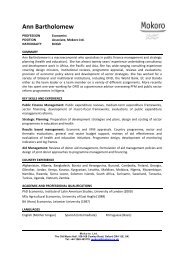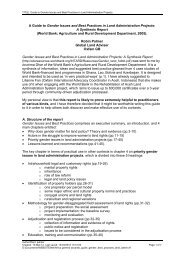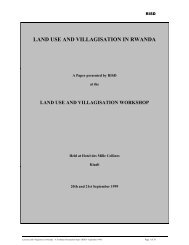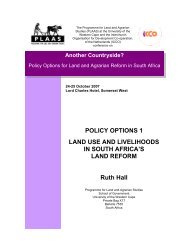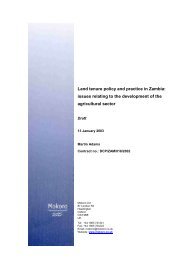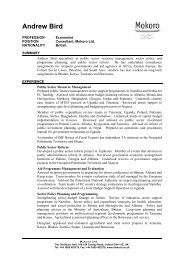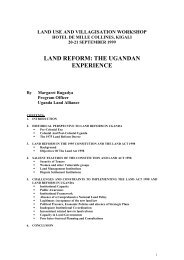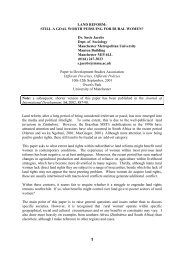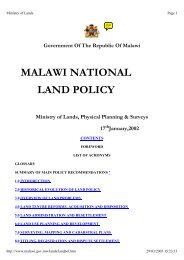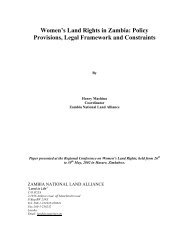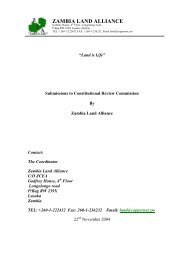The 1999 Land Act and Village Land Act - Mokoro
The 1999 Land Act and Village Land Act - Mokoro
The 1999 Land Act and Village Land Act - Mokoro
Create successful ePaper yourself
Turn your PDF publications into a flip-book with our unique Google optimized e-Paper software.
<strong>The</strong> <strong>1999</strong> <strong>L<strong>and</strong></strong> <strong>Act</strong> <strong>and</strong> <strong>Village</strong> <strong>L<strong>and</strong></strong> <strong>Act</strong> 18<strong>L<strong>and</strong></strong> <strong>Act</strong> to make it easier for banks to foreclose on bad mortgages where l<strong>and</strong> is put up ascollateral. A number of civil society activists have lobbied vigorously against the amendment,arguing that it would unfairly exposed disadvantaged farmers to being tricked into loosing theirl<strong>and</strong> by the banks. <strong>The</strong> Ministry of <strong>L<strong>and</strong></strong>s have also urged caution for the same stated reasons.<strong>The</strong> banks <strong>and</strong> the pro-amendment lobby are arguing that the <strong>L<strong>and</strong></strong> <strong>Act</strong> puts in place too oneroussafeguards against unfair appropriation by the banks. <strong>The</strong> effect of this, it is argued, is to raisethe risk, <strong>and</strong> therefore the price of giving loans against l<strong>and</strong> as collateral. This, it is argued, putsneedless breaks on economic growth. <strong>The</strong> anti-amendment lobby, civil society activists <strong>and</strong>Ministry, cautions against uncritical <strong>and</strong> hasty reform that could put the disadvantaged at risk.<strong>The</strong>y argue that there is a need for special safeguard to ensure that banks ensure that clients whoput up their l<strong>and</strong> as collateral fully underst<strong>and</strong> the consequences of foreclosure. <strong>The</strong>y areparticularly concerned about what is termed ‘small mortgages’, which refer to mortgages of lessthan 500,000 Shillings (approx. $500). <strong>The</strong> anti-amendment lobby agrees that there is a need toamend the reform in order to facilitate access to credit, but they disagree with the pace ofreform. 16<strong>The</strong> fact that there is public debate around the <strong>L<strong>and</strong></strong> <strong>Act</strong>s <strong>and</strong> that the Government recognisesthat there will be need to adjust the <strong>Act</strong>s through further amendments is positive. Having saidthat, it is striking how little in the <strong>Act</strong>s has been subject of debate since they legally came intoforce. It could be argued that the extensive reforms that Tanzania are in the process ofimplementing – notably Local Government Reform, Public Sector Reform, FinancialManagement Reform <strong>and</strong> Legal Sector Reform – as well as the National Strategy for Growth <strong>and</strong>Reduction of Poverty (NSGRP), have focused all public attention on those respective sectors. Inthe NSGRP process, for example, l<strong>and</strong> is not singled out as one of the priority areas, <strong>and</strong> it isstriking how little acknowledgment there is of the importance of l<strong>and</strong> ownership arrangement<strong>and</strong> security of tenure in economic development. 17As it st<strong>and</strong>s, the <strong>L<strong>and</strong></strong> <strong>Act</strong> is not likely to have any appreciable impact. It primarily serves to ironout a few earlier inconsistencies, by effecting a further concentration of powers in theCommissioner of <strong>L<strong>and</strong></strong>s. Procedures of allocation <strong>and</strong> administration of l<strong>and</strong> rights continue tobe highly discretionary <strong>and</strong> aimed at effecting detailed regulation of l<strong>and</strong> use by the owner of thel<strong>and</strong>. <strong>The</strong> emphasis remains one of ensuring economic development rather than on guaranteeingownership. This approach has failed singularly in the past, <strong>and</strong> there is no reason why it wouldwork in the future.It is a truism that the principal problem in the l<strong>and</strong> administration today is corruption in theallocation of titles <strong>and</strong> a complete lack of capacity to oversee <strong>and</strong> enforce the elaborativeregulatory framework of the l<strong>and</strong> administration. <strong>The</strong>re is little in the <strong>L<strong>and</strong></strong> <strong>Act</strong> that promises toredress these problems. <strong>The</strong> allowance for a premium of l<strong>and</strong> is intended to facilitate a l<strong>and</strong>market <strong>and</strong> forestall administrators doling out l<strong>and</strong> in return for illicit payments. <strong>The</strong> mere factthat it is at the Commissioner’s discretion whether the l<strong>and</strong> will be put out for public auctionrenders this provision without much value. Although it needs to be recognised that the Ministryof <strong>L<strong>and</strong></strong>s <strong>and</strong> many politicians will find it politically problematic to put up l<strong>and</strong> for public16 Interview with Magdalena Rwebangira, Chair of the Gender <strong>L<strong>and</strong></strong> Task Force, which has fronted the anti-amendmentlobby, 6 May 2003. Since the first draft of this essay was drafted, the Amendment has been enacted. I have not yet had theoccasion to include an analysis of the amendment.17 Contrast this with the persuasive argument made by Hern<strong>and</strong>o des Sotos in his book <strong>The</strong> Mystery of Capital thatproperty rights are the key to releasing capital for development (2000).



